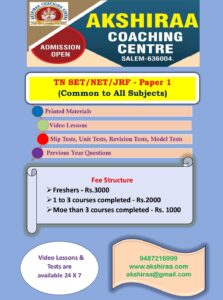Terms and Conditions:
-
Admission will be confirmed only after the complete payment of the fee. (Payment Receipt / Screenshot should be enclosed)
-
The fee once paid will not be refundable or transferable under any circumstances in the future.
-
Candidate should not share or copy or xerox any of our video lessons, material, document, or question paper otherwise his/her admission will be cancelled without any further enquiry and legal action must be taken against him/her.
-
Candidates must watch all video lessons compulsorily.
-
Candidate must attend Unit Tests, Revision Tests, and Model Tests compulsorily.
-
Admission will not be provided to those who are handling classes in other coaching centres or are planning to take coaching classes in the future.
Fee Structure:
(1) Freshers – Rs. 3000
(2) 1 to 3 Courses Completed Candidates – Rs.2000
(3) More than 3 Courses Completed Candidates – Rs.1000
-
For sample materials (pdf): Click Here https://drive.google.com/drive/folders/19kPbPe4HcqLVlbE982_T0YPkJxdQVrmW?usp=sharing
-
Sample videos are available: Click Here: https://www.youtube.com/channel/UCQATts5sNer2soAAkWeLCQA
Materials Overview
Unit I – Teaching Aptitude
|
S. No |
Title |
P. No |
|
1. |
Teaching |
6 |
|
2. |
Learner’s Characteristics |
16 |
|
3. |
Factors Affecting Teaching |
31 |
|
4. |
Methods of Teaching in Institutions of Higher Learning |
37 |
|
5. |
Teaching Support System |
58 |
|
6. |
Evaluation Systems |
71 |
Unit II – Research Aptitude
|
S. No |
Title |
P. No |
|
1. |
Research |
84 |
|
2. |
Methods of Research |
95 |
|
3. |
Steps of Research |
109 |
|
4. |
Thesis and Article Writing |
136 |
|
5. |
Application of ICT in Research |
146 |
|
6. |
Research Ethics |
150 |
Unit III – Comprehension
|
S. No |
Title |
P. No |
|
1. |
Strategies to Attempt Comprehension |
158 |
|
2. |
Exercises |
159 |
Unit IV – Communication
|
S. No |
Title |
P. No |
|
01. |
Communication: Meaning, Types and Characteristics of Communication |
165 |
|
02. |
Effective Communication: Verbal and Non-Verbal, Inter-Cultural and Group Communications, Classroom Communication |
182 |
|
03. |
Barriers to Effective Communication |
196 |
|
04. |
Mass-Media and Society |
204 |
Unit V – Mathematical Reasoning and Aptitude
|
S. No |
Title |
P. No |
|
01. |
Types of Reasoning |
6 |
|
02. |
Number Series |
8 |
|
03. |
Letter Series |
10 |
|
04. |
Analogy |
12 |
|
05. |
Coding and Decoding |
16 |
|
06. |
Blood Relationship |
19 |
|
07. |
Fraction |
24 |
|
08. |
Time and Distance |
26 |
|
09. |
Ratio, Proportion and Percentage |
28 |
|
10. |
Profit, Loss and Discounting |
30 |
|
11. |
Interest |
33 |
|
12. |
Average |
36 |
Unit VI – Logical Reasoning
|
S. No |
Title |
P. No |
|
1. |
Arguments, Propositions |
38 |
|
2. |
Inferences, Venn Diagram, Mood and Figure |
49 |
|
3. |
Fallacies, Uses of Language, Connotations and Denotations, Square of Opposition |
62 |
|
4. |
Indian Logic: Means of Knowledge |
74 |
|
5. |
Pramanas (Valid Knowledge) |
79 |
|
6. |
Vyapti (Invariable Relation), Hetvabhasas (Fallacies of Inference) |
88 |
Unit VII – Data Interpretation
|
S. No |
Title |
P. No |
|
1. |
Strategies to Attempt Data Interpretation |
92 |
|
2. |
Exercises |
95 |
Unit VIII – Information and Communication Technology
|
S. No |
Title |
P. No |
|
01. |
ICT – Introduction |
101 |
|
02. |
Basics of Computer |
103 |
|
03. |
Networking |
138 |
|
04. |
Internet and Intranet |
144 |
|
05. |
|
155 |
|
06. |
Audio and Video Conferencing |
159 |
|
07. |
Digital Initiatives in Higher Education |
161 |
|
08. |
ICT and Governance |
177 |
|
09. |
Abbreviations and Acronyms |
181 |
|
10. |
Computer Terminology |
190 |
Unit IX – People, Development and Environment
|
S. No |
Title |
P. No |
|
1. |
Development and Environment: Millennium Development and Sustainable Development Goal |
4 |
|
2. |
Human and Environment Interaction: Anthropogenic Activities and their Impacts on Environment |
10 |
|
3. |
Environmental Issues: Pollution, Waste, Climate Change |
15 |
|
4. |
Impacts of Pollutants on Human Health |
46 |
|
5. |
Natural and energy resources: Solar, Wind, Soil, Hydro, Geothermal, Biomass, Nuclear and Forests |
50 |
|
6. |
Natural Hazards and Disasters: Mitigation Strategies |
62 |
|
7. |
Environmental Protection Act (1986), National Action Plan on Climate Change, International Agreements and Efforts – Montreal Protocol, Rio Summit, Convention on Biodiversity, Kyoto Protocol, Paris Agreement, International Solar Alliance |
72 |
Unit X – Higher Education System
|
S. No |
Title |
P. No |
|
01. |
Institutions of Higher Learning and Education in Ancient India |
78 |
|
02. |
Evolution of Higher Learning and Research in Post-Independence India |
93 |
|
03. |
Oriental, Conventional and Non-Conventional Learning Programmes in India |
116 |
|
04. |
Professional, Technical and Skill Based Education |
134 |
|
05. |
Value Education and Environmental Education |
153 |
|
06. |
Policies, Governance, and Administration |
161 |

